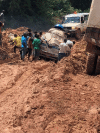Infrastructural Limitations in Establishing Neurosurgical Specialty Services in Liberia
- PMID: 36284802
- PMCID: PMC9584543
- DOI: 10.7759/cureus.29373
Infrastructural Limitations in Establishing Neurosurgical Specialty Services in Liberia
Abstract
Introduction Liberia recently employed the first neurosurgeon in the country's history. In a country with a population of 4.7 million people and staggering rates of cranial and spine trauma, as well as hydrocephalus and neural tube defects, neurosurgery is considered a luxury. Our study documents the experience of a team of neurosurgeons, critical care nurses, scrub technicians, nurses, and biomedical engineers who carried out a series of neurosurgical clinics and complex brain and spine surgeries in Liberia. Specifically, we aim to highlight some of the larger obstacles, beyond staff and equipment, facing the development of a neurosurgical or any other specialty practice in Liberia. Methods Our institutions, in collaboration with the Korle-Bu Neuroscience Foundation, spent 10 days in Liberia, based in Tappita, and performed 18 surgeries in addition to seeing several hundred clinic patients. This is a retrospective review of the cases performed along with outcomes to investigate obstacles in providing neurosurgical services in the country. Results Before arriving in Liberia, we evaluated, planned, and supplied staff and materials for treating complex neurosurgical patients. Sixteen patients underwent 18 surgeries at a hospital in Tappita, Liberia, in November 2018. Their ages ranged from 1 month to 72 years (average 20 years). Five patients (28%) were female. Ten patients (56%) were under the age of 18. Surgeries included ventriculoperitoneal shunting (VP-shunt), lumbar myelomeningocele repair, encephalocele repair, laminectomy, and a craniotomy for tumor resection. Ten patients (55%) underwent VP-shunting. Two patients (11%) had a craniotomy for tumor resection. Three patients (17%) had laminectomy for lumbar stenosis. Two patients (11%) had repair of lumbar myelomeningocele. Conclusion After an aggressive and in-depth approach to planning, conducting, and supplying complex neurosurgical procedures in Liberia, the greatest limiting factor to successful outcomes lie in real-time is access to health care, which is largely limited by overall infrastructure. Our study documents the experience of a team of neurosurgeons, critical care nurses, scrub technicians, nurses, and biomedical engineers who carried out a series of neurosurgical clinics and complex brain and spine surgeries in Liberia. Specifically, we aim to highlight some of the larger obstacles, beyond staff and equipment, facing the development of a neurosurgical or any other specialty procedural practice in the country of Liberia. Most notably, we focus on infrastructure factors, including power, roads, water, education, and overall health care.
Keywords: africa; infrastructure; international neurosurgery; liberia; neurosurgery in developing countries.
Copyright © 2022, Bowen et al.
Conflict of interest statement
The authors have declared that no competing interests exist.
Figures
References
-
- The World Bank Data - Liberia. The World Bank: Liberia. [ Jan; 2022 ]. 2022. https://data.worldbank.org/country/liberia https://data.worldbank.org/country/liberia
-
- The challenges and opportunities of global neurosurgery in East Africa: the neurosurgery education and development model. Leidinger A, Extremera P, Kim EE, Qureshi MM, Young PH, Piquer J. Neurosurg Focus. 2018;45:0. - PubMed
-
- Emerging trends in the neurosurgical workforce of low- and middle-income countries: A cross-sectional study. Kanmounye US, Lartigue JW, Sadler S, Yuki Ip HK, Corley J, Arraez MA, Park K. World Neurosurg. 2020;142:0–33. - PubMed
LinkOut - more resources
Full Text Sources

